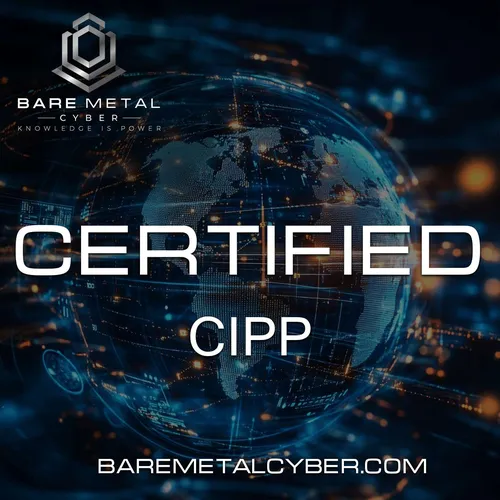
Certified - CIPP/US Audio Course
This Audio Course is your complete audio-first companion to the CIPP/US certification. Across structured episodes, it breaks down U.S. privacy law from federal and state frameworks to workplace rules and international overlaps, all aligned with the official IAPP Body of Knowledge. You’ll get guided walkthroughs of statutes, enforcement themes, case law, and key regulatory agencies, plus study strategies, glossary deep dives, and exam skills to build lasting confidence. Designed for on-the-go learning, it’s built to help you master the material and succeed on exam day.
- Update frequency
- every day
- Average duration
- 24 minutes
- Episodes
- 97
- Years Active
- 2025

Episode 57 — Financial Data Access: RFPA and BSA Requirements
Government access to financial data is governed by specific laws. This episode covers the Right to Financial Privacy Act (RFPA), which sets limits on government access to bank records, and the Bank S…

Episode 56 — Domain III Overview: Privacy and Government Requests for Data
Domain III introduces the critical issue of government access to private-sector information. This episode provides an overview of how laws regulate subpoenas, warrants, and requests from law enforcem…

Episode 55 — Web Scraping: Data Ethics and Legal Risk Considerations
Web scraping raises both ethical and legal challenges. This episode explains how scraping can collect vast amounts of personal information, often without consumer knowledge. We’ll discuss relevant st…

Episode 54 — Digital Advertising: Behavioral Tracking and Privacy Implications
Digital advertising relies heavily on tracking and profiling. This episode covers cookies, pixels, and device identifiers, along with how they enable targeted ads. We’ll examine the privacy implicati…

Episode 53 — Do-Not-Call Registries: DNC and Wireless Domain Registry
Telemarketing restrictions extend beyond the TSR and TCPA through registries that give consumers control. This episode explains the National Do-Not-Call (DNC) Registry, how consumers enroll, and the …

Episode 52 — Telecom and Media Statutes: Telecommunications Act, Cable Act, VPPA, and DPPA
Telecommunications and media involve a complex mix of statutes. This episode reviews the Telecommunications Act of 1996, which regulates customer proprietary network information, the Cable Communicat…

Episode 51 — Email and Fax Marketing: CAN-SPAM and JFPA
Electronic communications are major areas of privacy regulation. This episode explores the CAN-SPAM Act, which sets standards for commercial email, including opt-out requirements, truth in subject li…

Episode 50 — Telemarketing Rules: TSR and TCPA
Telemarketing is tightly regulated under the Telemarketing Sales Rule (TSR) and the Telephone Consumer Protection Act (TCPA). This episode explains the key provisions, including requirements for disc…

Episode 49 — EdTech Risks: Privacy and Security in Educational Technologies
As schools adopt digital platforms, new privacy and security risks emerge. This episode explores issues such as online learning platforms collecting student data, targeted advertising in education se…

Episode 48 — FERPA: Education Records and Student Rights
The Family Educational Rights and Privacy Act (FERPA) governs the privacy of student education records. This episode explains the rights it grants to parents and students, including access, correctio…

Episode 47 — Corporate Transactions: Privacy in Mergers, Acquisitions, and Divestitures
Mergers and acquisitions often involve transferring large volumes of personal data. This episode explains the privacy implications of corporate transactions, including how due diligence identifies ri…

Episode 46 — Online Banking: Biometrics, Third-Party Tracking, and Security
Online banking raises unique privacy issues. This episode looks at how institutions use biometrics for authentication, the risks of third-party tracking in financial apps, and the growing security co…

Episode 45 — Dodd-Frank: CFPB Oversight of Consumer Financial Privacy
The Dodd-Frank Wall Street Reform and Consumer Protection Act created the Consumer Financial Protection Bureau (CFPB), which plays a central role in financial privacy. This episode explains the CFPB’…

Episode 44 — Identity Theft Prevention: Red Flags Rule in Practice
The Red Flags Rule is designed to help organizations detect, prevent, and mitigate identity theft. This episode explains how financial institutions and certain creditors must develop programs that id…

Episode 43 — GLBA: Privacy Rule, Safeguards Rule, and State Exemptions
The Gramm-Leach-Bliley Act (GLBA) governs privacy in the financial services sector. This episode introduces the GLBA Privacy Rule, which requires clear disclosures about data sharing and provides con…

Episode 42 — Financial Privacy: FCRA and FACTA Requirements
Financial data is heavily regulated in the U.S., and two major statutes govern its use: the Fair Credit Reporting Act (FCRA) and the Fair and Accurate Credit Transactions Act (FACTA). In this episode…

Episode 41 — Substance Use Disorder Records: 42 CFR Part 2 Protections
Health information involving substance use disorder patients receives special protections under federal law. This episode explains 42 CFR Part 2, which imposes stricter confidentiality standards than…

Episode 40 — 21st Century Cures: Interoperability and Data Sharing
The 21st Century Cures Act sought to promote innovation by improving interoperability and data sharing in healthcare. This episode explains how the Act prohibits “information blocking,” requiring hea…

Episode 39 — HITECH: Enforcement and Breach Notification Enhancements
The Health Information Technology for Economic and Clinical Health Act (HITECH) strengthened HIPAA enforcement and introduced federal breach notification requirements. This episode explores how HITEC…

Episode 38 — HIPAA Security Rule: Administrative, Physical, Technical Safeguards
Complementing the Privacy Rule, the HIPAA Security Rule sets standards for protecting electronic protected health information (ePHI). This episode breaks down its three safeguard categories: administ…